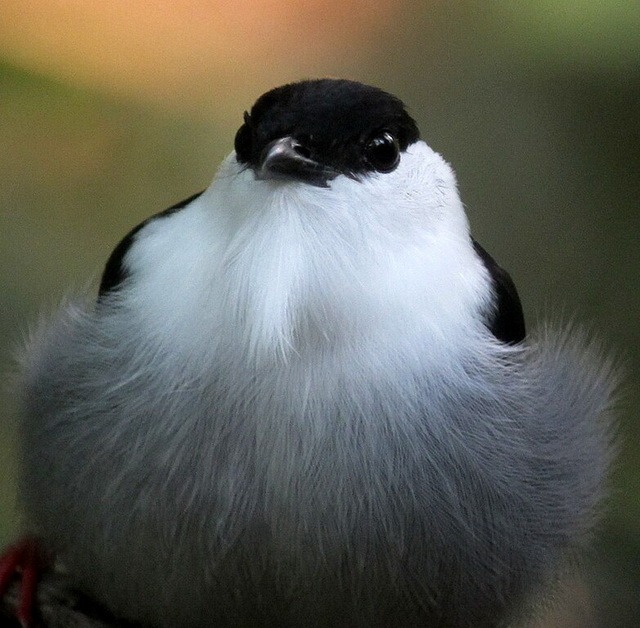White-bearded manakin with rich territory is more successful

A territory with plenty of food is a valuable asset for a male white-bearded manakin. The easier he finds food, the more time he spends on courtship display and the more females will visit him, as Luke Anderson and colleagues show.
In the white-bearded manakin, Manacus manacus, males contribute nothing to the care of the offspring. They occupy a territory in the vicinity of two to dozens of other males and try to attract as many females as possible and seduce them to mate. Females do the rest: after they have selected a male and copulated, they build a nest without help, incubate the eggs and raise the young.
Males with a territory that is rich in the fruits that they eat receive more female visits than males in a place with less food, Luke Anderson and colleagues discovered.
Costly courtship display
The white-bearded manakin, a small songbird, lives in forests in tropical South America. Like in many of the other 55 manakin species, the black-and-white males display spectacular courtship behaviour to attract females during the breeding season. Some males are much more successful than others.
A male possesses a territory in which he has cleared a court – a piece of ground of 15 to 90 centimetres in diameter, surrounded by saplings – down to the bare soil. Clean ground is safe, because a dangerous snake is perceived immediately. Moreover, the male stands out with his show. He puffs out his beard feathers, utters his call and leaps up and down between stems and the ground at lightning speed, his wings snapping and whirring. He can sustain this energetically costly show for up to half a minute at a time.
The olive-green females do best to choose a male of good genetic quality, to maximize the chance to produce successful offspring. An important criterium by which females can judge the quality of males is their courtship performance. The more intense the courtship is, the stronger and healthier the performer will be.
Uneven playing field
But now, Anderson writes that some white-bearded manakin males have an advantage by possessing a rich territory. The birds eat mainly ripe fruits, and territories differ greatly in fruit availability, his research in Ecuador shows. Males with a rich territory have to spend hardly time looking for food and are in good condition, he assumed. And indeed, as camera observations showed: the richer a territory was, the more time its owner spent on his shows.
And the more time a male spent displaying, the higher the frequency of female visits, thus the more reproductive success he had.
So, the displaying males are rivals on an uneven playing field; males with a rich territory are at an advantage. Is courtship performance then an honest signal of their quality?
Competition
It would be an dishonest signal if it is a coincidence whether a white-bearded manakin male occupies a rich territory, his quality having nothing to do with it.
But probably, the males have to compete for the best place, and the highest quality male will obtain the richest territory where he can spend much time on courtship display. In this case, the courtship performance is an honest signal for females to assess male quality.
The birds deposit the seeds of the fruits they eat back into their territory. In this way, places with fruiting plants will continue to exist. Males are long-living and can occupy the same territory for up to eleven years.
Willy van Strien
Photo: White-bearded manakin male. Félix Uribe (Wikimedia Commons, Creative Commons CC BY -SA 2.0)
Watch a video of a displaying white-bearded manakin male on You Tube
Sources:
Anderson, H.L., J. Cabo & J. Karubian, 2024. Fruit resources shape sexual selection processes in a lek mating system. Biology Letters 20: 20240284. Doi: 10.1098/rsbl.2024.0284
Cestari, C. & M.A. Pizo, 2014. Court cleaning behavior of the white-bearded manakin (Manacus manacus) and a test of the anti-predation hypothesis. The Wilson Journal of Ornithology, 126: 98-104. Doi: 10.1676/13-032.1